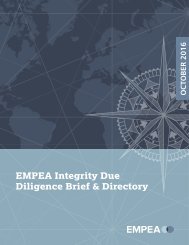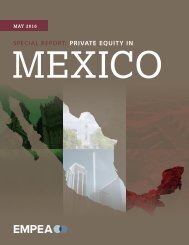You also want an ePaper? Increase the reach of your titles
YUMPU automatically turns print PDFs into web optimized ePapers that Google loves.
services industry. However, recent pressure has meant that<br />
Switzerland and other European centres (e.g., Liechtenstein)<br />
have been encouraged to adopt more transparent<br />
standards. The issue <strong>of</strong> tax avoidance is also one that<br />
can <strong>of</strong>ten be tackled by recipient countries <strong>of</strong> investments.<br />
Switzerland was forced to abandon its secrecy laws through<br />
a concerted effort by the US and European countries.<br />
African countries too have the means to ensure tax leakage<br />
is minimised. Kenya, for example, has recently entered<br />
into an information sharing agreement with Mauritius that<br />
enables it to enforce the collection <strong>of</strong> capital gains taxes. 3<br />
In general many <strong>of</strong> these ‘<strong>of</strong>fshore’ centres are fairly small<br />
economies with few other significant sources <strong>of</strong> income.<br />
They found that hosting the administrative functions <strong>of</strong><br />
many financial activities was an area that had relatively low<br />
barriers to entry provided they could <strong>of</strong>fer an attractive tax<br />
regime to encourage financial institutions and investors to<br />
use them.<br />
For example, the Cayman Islands have built local expertise<br />
in setting up financial vehicles and in administering<br />
their activities. In the case <strong>of</strong> private equity funds, this<br />
generally means fund administration and legal services. As<br />
noted above, there is little evidence that centres such as<br />
Mauritius and Cayman have tried to, or have succeeded in<br />
becoming host to the actual private equity fund managers<br />
(i.e., the teams that carry out the actual fund investment<br />
management). Most <strong>of</strong> the largest private equity companies<br />
and their staff are located in the largest global or regional<br />
financial centres. In some cases, they will locate staff and<br />
build <strong>of</strong>fices in regions where they are investing capital. In this<br />
context, many <strong>of</strong> the managers have actually located staff in<br />
Africa. Currently their choice <strong>of</strong> location also reflects other<br />
factors such as quality <strong>of</strong> infrastructure and living standards.<br />
As a result, cities such as Johannesburg and Nairobi (both<br />
<strong>of</strong> which also serve as regional airline hubs) are favoured<br />
over others.<br />
This has implications for the developmental impact that the<br />
financial activities can have for the local economy. Clearly it<br />
is preferable to attract not only the administrative functions<br />
but also the mainstream banking and fund management<br />
activities. This will mean that the financial centre will attract<br />
a larger cross section <strong>of</strong> high quality pr<strong>of</strong>essionals and will<br />
be host to many <strong>of</strong> the value-added activities. Such an effect<br />
is even evident in global centres such as London.<br />
4. PREREQUISITES FOR<br />
CREATING FINANCIAL<br />
CENTRES<br />
As we have seen, financial centres come in different shapes<br />
and sizes. They vary in the range <strong>of</strong> services they <strong>of</strong>fer and<br />
hence in the level <strong>of</strong> activity that effectively takes place<br />
within them. This complicates the picture for policymakers<br />
and in particular for external policy advocates that are<br />
seeking to influence certain factors with a view to catalysing<br />
the creation <strong>of</strong> these centres in specific locations. That said,<br />
there are certain factors that make cities more attractive as<br />
prospective financial centres.<br />
At a macro level, the centre must <strong>of</strong>fer a stable financial<br />
and legal environment. This has several important aspects<br />
to it. The most important one is the need for effective and<br />
transparent rule <strong>of</strong> law. This needs to encompass amongst<br />
other issues effective property rights, effective contract law<br />
and the basics <strong>of</strong> creating business entities that operate<br />
in an internationally recognisable manner. The legal<br />
framework should follow international principles and law<br />
firms from different countries should feel comfortable in<br />
dealing with it. There needs to be a degree <strong>of</strong> comfort that<br />
disputes can be resolved in a fair and transparent manner<br />
without interference from local vested interests.<br />
Additionally, the economy should have accounting<br />
standards, disclosure requirements and a regulatory<br />
framework that are in line with international best practice. In<br />
particular the regulatory framework for the financial system<br />
should be robust and transparent. The financial regulatory<br />
framework will most likely include the central bank, the<br />
stock exchange and any other regulator with responsibility<br />
for the financial sector.<br />
Ideally the political system is democratic and there are free<br />
elections but these points can be debated in the case <strong>of</strong><br />
Singapore, Dubai, Hong Kong and certain other financial<br />
centres. But it would be true to say that economic and<br />
political stability are a prerequisite for attracting financial<br />
services companies. We cannot overemphasise the<br />
importance <strong>of</strong> a predictable regulatory and legal regime for<br />
the choice <strong>of</strong> legal jurisdiction <strong>of</strong> capital. Investors do not<br />
need ideological adherence to any political system; political<br />
3<br />
Of the three main types <strong>of</strong> taxes, income tax, withholding tax, and capital gains tax, the latter was most frequently circumvented by structuring investments<br />
through <strong>of</strong>fshore financial centres. With information sharing in place, countries such as Kenya and Tanzania are now empowered to set the level <strong>of</strong><br />
taxation they deem appropriate, and to collect these taxes in-country.<br />
<strong>Conduits</strong> <strong>of</strong> <strong>Capital</strong> – Onshore Financial Centres and Their Relevance to African Private Equity<br />
| 107





